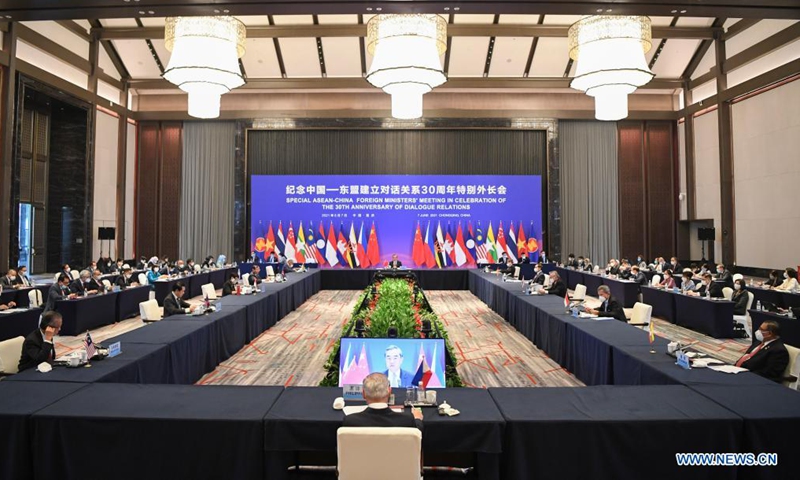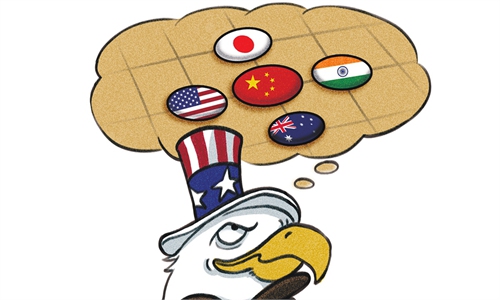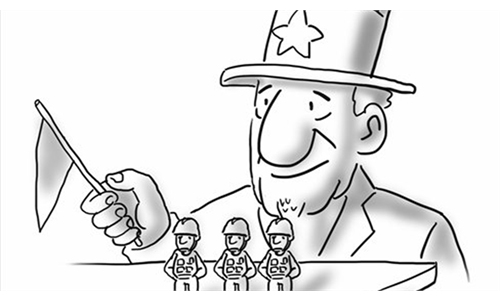Be wary of Quad driving a wedge in ASEAN bloc

The Special ASEAN-China Foreign Ministers' Meeting in Celebration of the 30th Anniversary of Dialogue Relations is held in Chongqing, southwest China, June 7, 2021. (Xinhua/Wang Quanchao)
With voices that believe the pandemic has undermined ASEAN's influence emerging, some people put forward the idea that the Quad can be an alternative regional security platform that can take the bold steps ASEAN cannot. It's obviously very absurd to advocate Quad to meddle in affairs within ASEAN's duties.
Regional affairs should be handled by regional countries only. This is why there is a relatively broad consensus on ASEAN's centrality in regional affairs. The four Quad countries are all outsiders. The formation of this grouping was driven by a confrontational Cold War mentality with a major purpose of containing China's rise. It is impossible for such a so-called security platform to truly care about regional affairs in Southeast Asia. Nor can it handle regional affairs well in an earnest manner.
Quad's security concepts are quite different from those of ASEAN. Quad is a closed security platform comprised of a small number of countries that features confrontation. By contrast, ASEAN is an open security platform of regional countries.
The US, which leads the Quad, has adopted a multifaceted approach to deal with regional affairs in Southeast Asia. On the one hand, it admits ASEAN's centrality. But on the other, it is dissatisfied with the fact that it has failed to turn ASEAN into a geopolitical tool. Therefore, Washington has the intention to make the Quad a potential tool to intervene in Southeast Asia's regional affairs.
Against such a background, it's impossible for Quad to replace ASEAN as a main regional security order platform. First, ASEAN countries cannot accept this and they will firmly insist on ASEAN's central role. Second, relevant countries, including China, cannot allow this. This is a very critical factor.
In the Quad Leaders' joint statement released after the leaders' summit in March, it reaffirms Quad's "strong support for ASEAN's unity and centrality." But meanwhile, it stresses their support for "freedom of navigation" and "overflight." Quad members have no choice but to support ASEAN because ASEAN's centrality is an international consensus. Yet Quad still wants to play a bigger role in regional security matters.
The Quad may gradually exert its influence. The four members are partners within the cooperation framework of ASEAN. Therefore, Quad may take advantage of this and make more collective voice during their cooperation with ASEAN in handling regional security issues.
"If the Quad and others decide the region's order and frameworks, regardless of the will and intentions of ASEAN, there is a risk of shaking the centrality of ASEAN," said Koichi Ishikawa, a research fellow at the Institute of Asian Studies at Japan's Asia University, while speaking to Nikkei on Tuesday.
If the Quad really marginalizes ASEAN, it will have a profoundly negative impact on regional security. First, it will shake the existing regional security architecture with ASEAN at the center. Second, the Quad is unlikely to truly maintain regional security and stability. This may bring the whole region into unprecedented chaos and expose more security risks.
Indonesian Defense Minister Prabowo Subianto said at the ASEAN Defense Ministerial Meeting last week that "It is very important for ASEAN to view this region as a unified whole, and not to allow a bigger power to potentially divide ASEAN."
From a long-term perspective, if ASEAN wants to prevent from being divided, it must strengthen its cohesion and build the bloc into an efficient platform in dealing with regional security matters.
In addition, ASEAN can proactively strengthen cooperation with external powers who can truly support its central position, such as China. If it can well utilize both internal and external forces, it will retain its position as an effective platform in regional affairs in the future.
The author is a research fellow and deputy director at the Institute of International Relations of the Shanghai Academy of Social Sciences. opinion@globaltimes.com.cn



